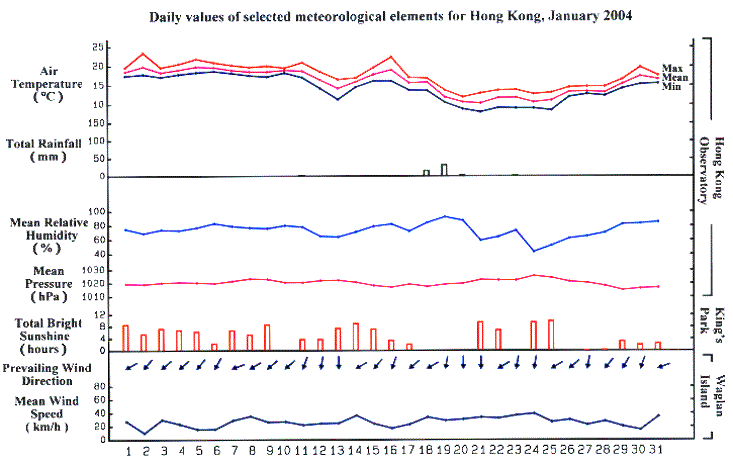The Weather of January 2004
|
January 2004 was cloudier and wetter than usual. The total bright sunshine duration of 136.8 hours was 15.6 hours below the normal figure. The monthly rainfall was 51.0 millimetres, more than double the normal figure of 23.4 millimetres. Although the monthly mean temperature of 15.8 degrees was equal to the normal figure, the mean maximum temperature of 13.4 degrees during the cold spell from 19 to 27 January was the lowest for the same period of the year since 1947. Under the influence of a weak northeast monsoon, the first three days of the year 2004 was fine and hazy. Some light rain fell on the morning of 4 January. It became mainly fine until 9 January. Haze was reported again on 6 January under light wind conditions. A surge of winter monsoon brought some light rain to the territory on 10 January. As the rain ceased the next day, mainly fine weather returned but it became progressively cooler. The first Cold Weather Warning of the year was issued on 12 January and the temperature fell below 12 degrees the next morning. The weather remained mainly fine and cool on 14 and 15 January. A cold front crossed the South China coast on 16 January and brought some rain patches to the territory, the weather became mainly fine again on the next day. An intense surge of the winter monsoon arrived at Hong Kong on 18 January. It brought rainy weather for three days. It also brought a spell of cold weather that necessitated the issuance of the Cold Weather Warning between the evening of 18 January to noon 27 January. The length of the warning being 204 hours 45 minutes set a new record since the Cold Weather Warning system was introduced in 1999. The lowest temperature of the month was 8.0 degrees recorded on 21 January. It was also the third lowest on record for Chinese New Years Eve. With a replenishment of cold air, it was cold again in the morning of 28 January. The weather became milder on 29 January as the northeast monsoon weakened. It was misty with some light rain patches on 30 January under light winds conditions. Winds strengthened from the east overnight and the weather remained cloudy on the last day of the month. No tropical cyclones occurred in the South China Sea and the western North Pacific in the month. Details of issuance and cancellation of various warnings/signals in the month are summarized in Tables 1.1 to 1.3. Monthly meteorological figures and departures from normal for January are tabulated in Table 2. |
Warnings and Signals issued in January 2004
| Beginning Time | Ending Time | ||
|---|---|---|---|
| Day/Month | HKT | Day/Month | HKT |
| 21 / 1 | 0505 | 21 / 1 | 0945 |
| 23 / 1 | 2000 | 24 / 1 | 1130 |
| Colour | Beginning Time | Ending Time | ||
|---|---|---|---|---|
| Day/Month | HKT | Day/Month | HKT | |
| Red | 31 / 12 | 1100 | 1 / 1 | 0600 |
| Yellow | 1 / 1 | 0600 | 1 / 1 | 1800 |
| Yellow | 3 / 1 | 0600 | 5 / 1 | 0600 |
| Red | 13 / 1 | 0600 | 13 / 1 | 1800 |
| Red | 14 / 1 | 1145 | 14 / 1 | 1800 |
| Yellow | 17 / 1 | 0600 | 18 / 1 | 1200 |
| Red | 21 / 1 | 0600 | 22 / 1 | 1800 |
| Yellow | 22 / 1 | 1800 | 23 / 1 | 0600 |
| Red | 23 / 1 | 1245 | 23 / 1 | 1800 |
| Red | 24 / 1 | 0600 | 26 / 1 | 0600 |
| Yellow | 26 / 1 | 0600 | 27 / 1 | 0600 |
| Red | 27 / 1 | 0600 | 27 / 1 | 1800 |
| Yellow | 27 / 1 | 1800 | 28 / 1 | 1800 |
| Beginning Time | Ending Time | ||
|---|---|---|---|
| Day/Month | HKT | Day/Month | HKT |
| 12 / 1 | 2345 | 13 / 1 | 1025 |
| 18 / 1 | 2315 | 27 / 1 | 1200 |
| 27 / 1 | 2315 | 29 / 1 | 0745 |
| Meteorological Element | Figure of the Month | Departure from Normal |
|---|---|---|
| Mean Daily Maximum Air Temperature | 17.5 degrees C | 1.1 degrees below normal |
| Mean Air Temperature | 15.8 degrees C | normal |
| Mean Daily Minimum Air Temperature | 14.2 degrees C | 0.6 degree above normal |
| Mean Dew Point Temperature | 10.9 degrees C | 0.7 degree above normal |
| Mean Relative Humidity | 73 % | 2 % above normal |
| Mean Cloud Amount | 67 % | 9 % above normal |
| Total Rainfall | 51.0 mm | 27.6 mm above normal |
| Total Bright Sunshine Duration | 136.8 hours | 15.6 hours below normal |
| Mean Daily Global Solar Radiation | 9.88 Megajoule / square metre | 1.75 Megajoule below normal |
| Total Evaporation | 70.3 mm | 27.2 mm below normal |
| Remarks : | All measurements were made at the Hong Kong Observatory except sunshine, solar radiation and evaporation which were recorded at King's Park Meteorological Station. |
